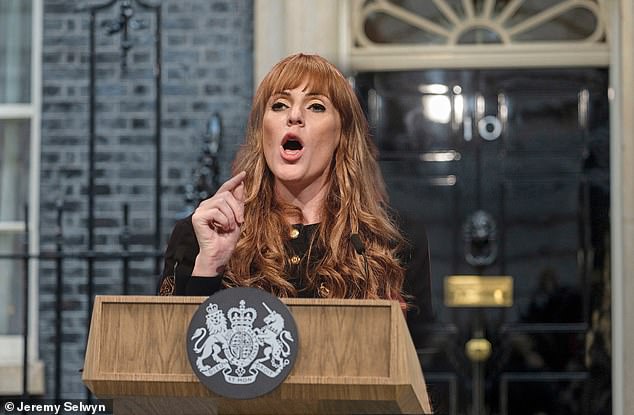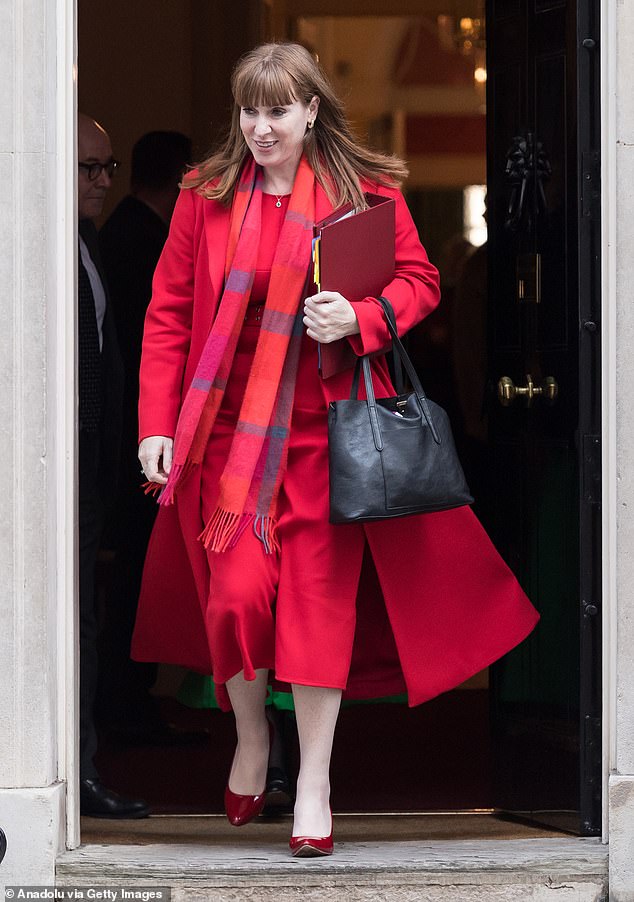Angela Rayner narrows her eyes and grips the podium outside No 10. The moment calls for plain speaking – and plain speaking, she tells herself, is what she does best.
‘All right, let’s be honest. The markets are out to get us. The bankers, the investors, the money men. The pinstriped scum, absolute pile of asset-stripping Old Etonian piece of scum.’
She pauses, noting the reaction as foreign journalists try to process her vernacular.
‘We didn’t cause this crisis,’ she declares. ‘We inherited a broken system after 14 years of Tory failure. But we are going to clean up the mess.’
Do lobby correspondents wince when she trots out the ‘Tory failure’ line? Never mind, this time it is the Tories and the vermin voting for them who are going to pay.
‘I am not going to balance the books on the backs of working people. Instead of cuts, I will make the rich pay their share.’
What follows is the most eye- watering package of tax rises ever announced by a British government – vastly more shocking than the previous year’s.
Back in 2025, when Rayner’s predecessor Sir Keir Starmer was still in charge, Labour tried to push through a mild slowing of the growth in benefits and of the spiralling special-needs budget.
Labour MPs were having none of it, and Rayner had spotted her chance. First, she jumped on the small-boats issue. With Starmer doing his fish-on-the-slab look as Channel crossings reached record highs, she played the card of authentic working-class empathy.

‘Angela Rayner narrows her eyes and grips the podium outside No 10. The moment calls for plain speaking – and plain speaking, she tells herself, is what she does best,’ writes Daniel Hannan
During a Cabinet meeting, she argued that the Government must accept the ‘real concerns people have’ about the ‘profound impact’ of immigration. She made sure that those remarks were widely covered and then moved on to her second offensive, aligning with Labour MPs’ calls for the recognition of a Palestinian state.
With Rachel Reeves’ reputation in tatters, and Wes Streeting overwhelmed by the doctors’ strike, she was now the driving force in the Government.
As the recession worsened, it was her agenda, spelled out in a private memo in early 2025, that was adopted: taxes on pensions, investments and inheritance, an increase in stamp duty and a freeze in tax thresholds.
Raising those taxes had made things worse, of course. As the revenue-generating bit of the economy shrank and the revenue-consuming bit ballooned, Britain entered a downward spiral.
The higher tax rates went, the less they brought in. Some people retired early. Others went on to benefits. And a substantial number emigrated.
It wasn’t just millionaires, either. Young people who made up in ambition what they lacked in qualifications were moving in droves. These were fitness instructors, hairdressers, builders. Meanwhile, the benefits bills continued to explode. Labour was constitutionally incapable of cutting spending.
International businesses and financial institutions could see what was going on. First, they stopped investing in Britain; then, they stopped lending it money.
Ironically, the 2026 gilt strike – that sudden drop in the price of government bonds and all it meant for our already surging interest payments on the national debt – was not triggered by events in the UK. The immediate cause was a sudden worsening in relations between the US and China.
But markets are not interested in geography. They look for the weakest link, the zebra limping behind the rest. With its swollen budget, immigration and emigration crises and failing public services, Britain under Labour had become that hobbling zebra.
What followed was a full-scale financial crisis. The cost of borrowing spiked. The Bank of England’s interventions were overwhelmed. The pound collapsed and imports became luxuries. And so, the International Monetary Fund was called in. It demanded immediate cuts and long-term savings to restore Britain’s credibility. Reductions in benefits for working-age adults were the least of it. When the disease was as serious as Britain’s, the cure was going to be painful.

Blairites made a half-hearted attempt to build a campaign around Wes Streeting, but the parliamentary party felt it could not leap-frog a female deputy, so Angela Rayner was anointed
The state-pension age would have to rise to 70. Those receiving public-sector pensions would take a haircut. All but the poorest would have to pay to visit their GP. One in five government employees would be laid off, and the rest would see real-terms pay cuts of 15 per cent. MPs would take a 25 per cent cut, ministers 30 per cent.
Sir Keir tried to haggle over the terms but he was in no position to bargain. Drained and pale, he put the cuts package before Parliament. Labour MPs were still in no mood to listen. They acted as if the cuts were voluntary. As one said when voting down the benefits reforms in 2025: ‘I don’t understand why this means tax rises when it’s only a few billion pounds.’
The exhausted PM seemed to grin for the first time in months as he accepted the inevitable and resigned. Blairites made a half-hearted attempt to build a campaign around Streeting, but the parliamentary party felt it could not leap-frog a female deputy. So Rayner was anointed on a promise to halt the cuts.
Now the once teen mum from Stockport was standing in front of the world’s most famous door, making good on her promise.
‘As I said during the leadership campaign, I won’t let ordinary people pay for the mistakes of the rich. Higher rate income tax will now kick in at 50 per cent on incomes above £50,000. The additional rate of 75 per cent will apply from £75,000. Those with the broadest shoulders should bear the biggest burden.’
She is reading quickly now. ‘Inheritance tax and capital gains tax will be set at 50 per cent, and there will be no more exemptions for people’s primary residences.
‘At the same time, houses or land holdings worth more than £1 million will pay 1 per cent of their additional value as part of our Land Tax. That’s the way to get money into the real economy instead of sitting in portfolios.’
Then comes the bombshell. ‘After discussions with the CEOs of our main banks this morning, I am levying a one-off surcharge on idle money. Any bank account containing more than £50,000 will pay 5 per cent of the surplus. That levy applies to accounts as of midnight last night, and is being collected directly by the banks.’
There is stirring before her. ‘Some will say that tax rises don’t work, but that’s a rich man’s argument if ever I heard one. Others will say that you can’t buck the market, that the cuts will come sooner or later. I say nonsense. We are a democracy, not a hedge fund. You voted against the cuts, and I will honour your vote.’
With that, she turns on her heel and disappears into No 10. As the big black door closes behind her with an ominous thud, the whole country seems to shake.
Lord Hannan of Kingsclere is president of the Institute for Free Trade












